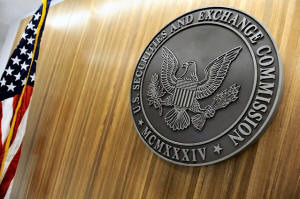|
SEC judge appointments unconstitutional,
U.S. high court says
 Send a link to a friend
Send a link to a friend
 [June 22, 2018]
By Andrew Chung [June 22, 2018]
By Andrew Chung
WASHINGTON (Reuters) - The U.S. Supreme
Court gave presidents more control over key jobs in federal agencies on
Thursday, ruling that the way the Securities and Exchange Commission
selected in-house judges who enforce investor protection laws violated
the U.S. Constitution.
The justices agreed with President Donald Trump's administration that
the SEC, in having low-level staff install administrative law judges,
infringed upon powers given to the president in the U.S. Constitution's
"appointments clause" regarding the filling of certain federal posts.
The ruling could reverberate through the federal government, which has
nearly 2,000 administrative law judges who decide matters as varied as
unfair trade practices, veterans benefits and patent infringement.
The court's 7-2 decision backed Raymond Lucia, a California-based former
radio host and investment adviser who was banned by an SEC
administrative law judge from investment-related work and fined $300,000
for making misleading claims in his "Buckets of Money" retirement wealth
strategy.

The ruling marked a victory for the Republican president, who has sought
to limit the power of certain federal agencies. Trump's administration
sided with Lucia, reversing the government's previous stance supporting
the SEC taken by the administration of his Democratic predecessor,
Barack Obama.
The Justice Department said it was pleased with the decision.
The ruling, authored by liberal Justice Elena Kagan, could also make it
easier for these in-house judges to be fired by a president's political
appointees in agencies rather than being protected from such action, as
is currently the case.
The justices overturned a lower court ruling that had endorsed the SEC's
hiring practice for the judges. The agency's commissioners, who are
presidentially appointed, should have named them, not SEC staff, the
justices said.
Six justices found the hiring process unconstitutional while Justice
Stephen Breyer said it violated only federal administrative law.
Justices Ruth Bader Ginsburg and Sonia Sotomayor dissented.
Lucia must now be given a new hearing in front of a properly appointed
administrative judge, or the commission itself, the justices said.
'CONSTITUTIONAL ACCOUNTABILITY'
"We are thrilled with the result, which is a victory for the rule of
law, constitutional accountability and liberty," Lucia's attorney Mark
Perry said.
[to top of second column]
|

The seal of the U.S. Securities and Exchange Commission hangs on the
wall at SEC headquarters in Washington, DC, U.S., June 24, 2011.
REUTERS/Jonathan Ernst/File Photo

An SEC spokesman said the agency is reviewing the decision.
The SEC had argued that its judges were merely employees in part
because their decisions are not final and still subject to review by
the commission.
It marked the latest case in which the Supreme Court limited the
SEC's powers. The justices last year scaled back the agency's
ability to recover ill-gotten profits from defendants' misconduct,
and on Monday accepted a case that could narrow the scope of
defendants' liability for securities fraud.
With Thursday's decision, "the Supreme Court continues its growing
streak of rebukes to the SEC," said Nick Morgan, a lawyer at the
firm Paul Hastings who previously worked in the agency's enforcement
division.
Kagan said administrative judges wield powers extensive enough to
qualify under the Constitution as "inferior officers" subject to
appointment by the president, a federal department head or a court.
Just "as armies can often enforce their will through conventional
weapons, so too can administrative judges," Kagan said.
The SEC charged Lucia with securities fraud in 2012. SEC
Administrative Law Judge Cameron Elliot found him liable, barring
him from the industry and ordering him to pay $300,000 in fines.
Corporate rights groups had complained that as the SEC's enforcement
powers expanded, it sent more cases to its own judges rather than
federal district courts, giving the agency an unfair "home court"
advantage.

The ruling could affect dozens of cases pending before the SEC and
other cases in federal appeals courts. Perry, Lucia's lawyer, said
there are about 150 administrative judges across 25 agencies who
might fall under the officer designation.
(Reporting by Andrew Chung; Editing by Will Dunham)
[© 2018 Thomson Reuters. All rights
reserved.]
Copyright 2018 Reuters. All rights reserved. This material may not be published,
broadcast, rewritten or redistributed.
Thompson Reuters is solely responsible for this content.
 |